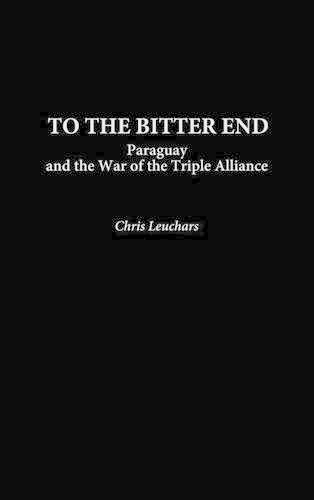
To the Bitter End: Paraguay and the War of the Triple Alliance
(Hardback)
Publishing Details
To the Bitter End: Paraguay and the War of the Triple Alliance
By (Author) Christopher Leuchars
Bloomsbury Publishing PLC
Praeger Publishers Inc
30th December 2002
United States
Classifications
General
Non Fiction
Warfare and defence
989.205
Physical Properties
Hardback
264
Width 156mm, Height 235mm
539g
Description
The War of the Triple Alliance was one of the longest, least remembered, and, for one of its participants, most catastrophic conflicts of the 19th century. The decision of Argentina, Brazil, and Uruguay to go to war against Paraguay in May 1965 has generally been regarded as a response to the raids by the headstrong and tyrannical dictator, Francisco Solano Lopez. While there is some truth to this view, as Lopez had attacked towns in Argentina and Brazil, the terms of the Triple Alliance signed that same month reveal that the motivation of these two nations, at least, was to redraw the map in their favor, at the expense of Paraguay. That the resulting conflict lasted five years before Lopez was defeated and his country fully at the mercy of its neighbors was a tribute to the heroic resistance of his people, as well as to the inadequacies of the allied command. The military campaigns, which took place on land and on the rivers, often in appalling conditions of both climate and terrain, are examined from a strategic perspective, as well as through the experiences of ordinary soldiers. Leuchars looks in detail at the political causes, the course of the conflict as viewed from both sides, and the tragic aftermath. He brings to light an episode that, for all its subsequent obscurity, marked a turning point in the development of South American international relations.
Reviews
"A good profuously mapped general survey treatment of the protracted "Lopez War" (1864-1870) that pitted Paraguay against Argentina, Brazill, and Uruguay....[p]rovides a good account of military developments and is likely to be of value to anyone seeking an introduction to the subject."-The NYMAS Review
[A] valuable addition....[o]ffers thoughtful, balanced interpretations, placing the struggle within the wider context of nation-building.-War in History
A good profuously mapped general survey treatment of the protracted "Lopez War" (1864-1870) that pitted Paraguay against Argentina, Brazill, and Uruguay....[p]rovides a good account of military developments and is likely to be of value to anyone seeking an introduction to the subject.-The NYMAS Review
Chris Leuchars presents a straightforward, clearly written account of the Paraguayan War(1864-70), also known as the War of Triple Alliance.... To the Bitter End is a good introducrtion to the conflict.-The Journal of Military History
This is a military study of the bloody conflict pitting Paraguay against the allied forces of Brazil, Argentina, and Uruguay in the 1860s. Any work in English shedding light on Paraguay's first half century of independence, the role of its first president, Dr. Francia, its distinct autochthonous culture, or the collective will that enabled this small country to defy invaders even after half of its inhabitants had perished in the effort, is welcome. The book will satisfy those interested in actual military engagements, the technology employed, military formations, and other topics neglected by social historians....Recommended. General and undergraduate collections.-Choice
"A valuable addition....offers thoughtful, balanced interpretations, placing the struggle within the wider context of nation-building."-War in History
"[A] valuable addition....[o]ffers thoughtful, balanced interpretations, placing the struggle within the wider context of nation-building."-War in History
"Chris Leuchars presents a straightforward, clearly written account of the Paraguayan War(1864-70), also known as the War of Triple Alliance.... To the Bitter End is a good introducrtion to the conflict."-The Journal of Military History
"This is a military study of the bloody conflict pitting Paraguay against the allied forces of Brazil, Argentina, and Uruguay in the 1860s. Any work in English shedding light on Paraguay's first half century of independence, the role of its first president, Dr. Francia, its distinct autochthonous culture, or the collective will that enabled this small country to defy invaders even after half of its inhabitants had perished in the effort, is welcome. The book will satisfy those interested in actual military engagements, the technology employed, military formations, and other topics neglected by social historians....Recommended. General and undergraduate collections."-Choice
Author Bio
CHRIS LEUCHARS is Head of History at the Hinchingbrooke School, Huntingdon, United Kingdom.
